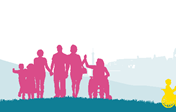If the young person has an EHCP at school then this is something that needs to be discussed at annual review meetings from year 9 onward in order to look at if the support of an EHCP is still needed.
If this support is still needed then the EHCP will stay in place and the college or training provider will provide the support which is described in the EHCP.
When the EHCP is reviewed, it should be discussed how a young person will manage with being in college for 3 days a week and what they will do for the other 2 days a week as well if any extra support is needed.
Kirklees Council should consider the need to provide a 5 day package of provision* & support (if required), this can be from education, health and social care.
*Provision can mean education, training, day care etc.
Five-day packages of provision and support do not have to be all at the same place and could involve amounts of time at different places and in different settings. For example a young person with complex needs may spend 3 full days a week in college and 2 days a week at a day care provision from social care.
It may include periods outside education institutions with appropriate support, including time and support for independent study. A package of provision can include non educational activities such as:
- volunteering or doing community activities
- work experience
- opportunities that will equip young people with the skills they need to make a successful transition to adulthood, such as independent travel training, and/or skills for living in semi-supported or independent accommodation
- training to enable a young person to develop and maintain friendships and/or support them to access facilities in the local community.
These packages can also include health related activities such as physiotherapy. Full-time packages of provision and support set out in the EHCP's should include any time young people need to access support for their health and social care needs.
When looking at what package would be appropriate, Kirklees Council should think about how young people learn and the additional time and support they may need to undertake coursework and homework as well as time to socialise with their college peers within the college environment.
In some cases, courses normally offered over three days may need to be spread over four or five days where that is likely to lead to better outcomes. Kirklees Council will need to work with providers and young people to ensure there is a range of opportunities that can be tailored to individual needs, including the use of Personal Budgets (where appropriate). More information about personal budgets can be found on the Local Offer personal budgets (education) page.
In making decisions about packages of support, Kirklees Council should take into account the impact on the family and the effect this impact is likely to have on the young person’s progress.
Who can you get help from with this?
There are a few teams in Kirklees who can help you to look at who can provide some help and support if needed:
- Community Enablement Team - can work with young people aged 16+ on independence skills. Please see our Community Enablement page.
- Community Plus - can help you to find community organisations and volunteering opportunities. Please see our Community Plus page.
- Children with a disability service (CWD) - This is a specialist children’s social care service with a focus on providing advice, support and services to disabled children and their families. Please see our CWD page.

